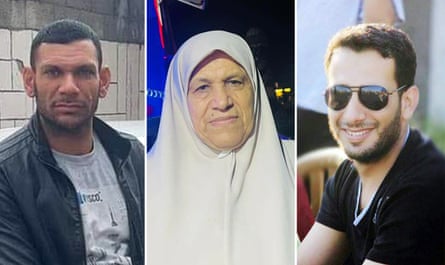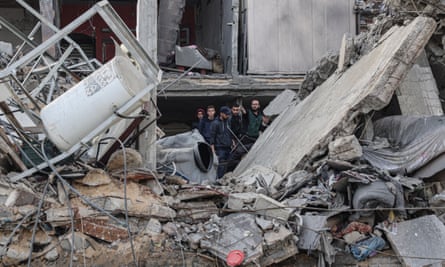Late one night in March, Ahmed Abu Jalala rose quietly, trying hard not to wake his family, sleeping around him on the floor of a UN-run school in northern Gaza.
The 54-year-old father knew his six children needed food, but after months of war there was none. Little aid reached Jabaliya, where they had been staying since fleeing their small home in the early weeks of the conflict, and his children had been reduced to eating wild plants. So Abu Jalala went out into the darkness to search for flour being brought by a humanitarian convoy.
“We would never have let him go if we’d known … We’ve not seen or heard of him since,” said Etemad Abu Jalala, the missing man’s uncle.
After six months of war, tens of thousands have disappeared in Gaza, their whereabouts unknown to their relatives or friends. The International Committee of the Red Cross has recorded more than 7,000 cases of missing persons since the start of the conflict in Gaza.

Abu Jalala, who had chronic psychological illness, has not been seen since the night he left his family in the shelter.
“We go out to search for him every day hoping to find him, but in vain. We hope that he is still alive. We have tried to contact hospitals and the police … but without any results,” his brother said.
More than 33,000 people, mostly women and children, have been killed in Gaza so far in the conflict, according to local health officials. Artillery bombardment and airstrikes have reduced entire blocks of flats or tenements to rubble across much of the territory, burying many whose deaths have gone unrecorded. Some of the dead have been placed in makeshift graves by strangers.
Raji Kamal Kaleel, 36, is still hoping for news of his wife and two-year-old daughter, whom he last saw in January during a bout of Israeli shelling and airstrikes in Gaza City.
“When the bombardment intensified on our neighbourhood, we decided to flee to a UN shelter, but on the way there was a big airstrike, and the whole area was filled black smoke. We couldn’t see each other so all of us ran in different directions,” Kaleel said.
When the smoke cleared, Kaleel found his mother, his 10-year-old son, and his oldest daughter, who is 11,, but not his wife or youngest child.

“I lost my closest friend and the mother of my children. Nothing will ever compare,” he said. “My life can’t continue without her. And I also lost my little daughter, a part of my heart. People tell me their bodies were vaporised or buried under the ruins, but I still have hope.”
Some of the disappeared, especially badly traumatised children or the psychologically ill, may still be alive, but unable to find their relatives after being separated.
Laila Dogmush disappeared when she set out to find her son, who had gone in search of possessions abandoned by her large family as they fled the Israeli offensive, which was triggered by attacks into Israel by Hamas in October which killed 1,200 people, mostly civilians.
“My mother pretended that she wanted to go to the nearby mosque for prayer but didn’t appear again,” Fidaa Dogmush, the 62-year-old’s son, said.
“Her psychological state might have been affected by the successive traumas that she lived through.”
Fadi Tambora’s mother last saw her 35-year-old son when he set out from a shelter in northern Gaza to join his pregnant wife, who had fled with her family to the south of the territory. In the several weeks since, she has had no news.
“My son is deaf since birth. He asked his father by sign language for money to join his wife but later that same day there was an airstrike and we were all scattered and we lost him,” Tambora’s mother, who preferred not to give her name, said.
Since then, there has been a single sighting of Tambora at a hospital in Jabaliya, and friends found some clothes and possessions nearby. But that was all.
Tambora’s mother fears her son may have been shot by Israeli troops after failing to respond to a warning that he could not hear.
“The only wish we have is for him to return to his baby that was just born two months ago,” she said.
For many who are searching, the prospect of detention by Israeli troops brings hope that their loved ones are alive, but fears too.
“We think around 1,000 are still imprisoned without charge or notification of relatives but it is very difficult to document what is going on. All we know is that we are getting lots of calls,” said Tala Nasir, a lawyer with Adammeer, an NGO which monitors Palestinians in Israeli detention.
Belal Al Masry, who ran a small printing business from his home in Gaza City, was detained by Israeli troops in the north of Gaza in the first month of the war, his relatives say. Since, his family’s efforts to get news of the 40-year-old from released prisoners have failed.
“Some told us that he is still with the soldiers, others said that he was dead. We don’t know whom to believe,” said Nashaat Al Masry, the missing man’s brother.

“All of us are worried and upset. Belal’s wife and children are still in the north and alone. We tried to talked to the Red Cross, but that didn’t work. We tried the Palestinian Red Crescent Society, many international and local NGOs, but in vain.”
For Hana Abu Jarad, 32, the disappearance of her husband, Ibrahim, has meant great hardship. The 37-year-old farmer remained in northern Gaza at the beginning of the war to care for his elderly mother and sister, while she and their four children fled south. A month later, his almost daily phone calls suddenly stopped. There has been no news since.
“Now I am taking care of my four children alone, and it’s really hard to get food with no income, considering high prices. When my youngest daughter asks me about her father and when he is going to come home, I invent some excuse to cover up his disappearing,” Abu Jared said.
One big problem in Gaza is communications, aid workers said. A lost phone cannot be replaced, and sim cards are impossible to find, making staying in touch or tracing lost children extremely difficult.
“Earlier in the conflict, there were thousands of people leaving their homes and walking south and if, for example, you lose hold of your child or a wounded loved one it can be incredibly challenging to find them again,” said Sarah Davies, spokesperson for the ICRC in Israel and the occupied territories.
“All over the world, people tell us that the most painful part of a conflict is not the hunger or the danger but the separation from relatives and not knowing what has happened to them.”
Fourteen-year-old Ibrahim Abu Mostafa said he missed his father, Ahmed, 37, who was wounded after leaving a shelter in the town of Khan Younis to fetch water and then disappeared.
